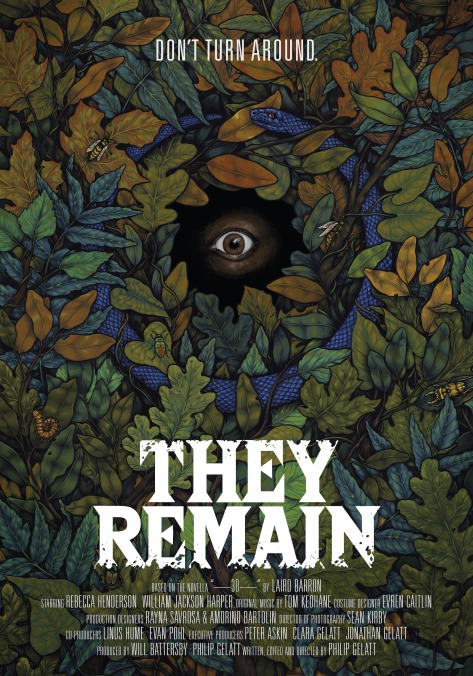They Remain pushes The Good Place’s William Jackson Harper to an unsettling bad place

They Remain knows that the past can never stay buried for long. The movie takes one of the most common of horror tropes—seen in everything from Poe’s “The Tell-Tale Heart” to the hoary old “ancient Indian burial ground” made famous by Poltergeist—and twists it, until potentially awful supernatural consequences become an occupational hazard. For the two scientists at the heart of this dreamlike film, digging too deep and unearthing something you wish you hadn’t just comes with the job.
They Remain doesn’t shy away from the implication of inevitability; “You know how this is going to end” is the first line of dialogue. In a way, any trouble that befalls the characters is out of their control: Both scientists, they’ve been dispatched by their company to a remote patch of forest in an unnamed area, and ordered to explore the physical landscape for possible biological breakthroughs. Their exact mission is unclear, as are the reasons they’ve been sent, and they both share the healthy skepticism of low-level workers employed by a massive corporation. But this much is clear: They’ve traveled to the site of a mass death, the place where a series of horrific acts were perpetuated by members of a cult many years prior. As the two set up cameras throughout the woods and take samples of dirt, insects, and more, we watch the days of their three-month mission begin to pass. As the routine becomes numbing, eerie incidents begin to mount. A strange knocking on their workspace wall. A weird sound from the treeline. Before long, it starts to become less a question of “Are these events real or all in their heads?” than a countdown to who cracks first.
With little in the way of plot (the source material is a short story), this sci-fi-tinged horror film is carried solely by the actors and atmosphere, and in the case of the former, it mostly succeeds. Apart from brief appearances by the helicopter pilot who picks up and drops off supplies, and some flashes of imagery presumably depicting the long-departed cultists, it’s a pure two-hander. The scientists, Keith and Jessica, are played with a surfeit of compelling ambiguity by William Jackson Harper and Rebecca Henderson. Harper, best known as Chidi on the NBC sitcom The Good Place, here stills all his gawky nervous energy to play a stoic and guarded man, one who can take us through a cycle of emotions with nothing but subtle adjustments of the eyes. We see the story unfold through his perspective, and most of the film is taken up with his solitary treks through the wilderness, as he begins to question the nature of his assignment and the intentions of his colleague. Both Keith and Jessica are almost ciphers—they’re little backstory or outward personality—but Harper in particular leans into the challenge with his charismatic minimalism.
Beyond the performances, They Remain is uneven. The film uses a series of innovative, old-school visual tricks to create a surreal and hallucinatory vibe, and when something works, it’s powerful and discomfiting: Cinematographer Sean Kirby plays around with harsh chiaroscuro and shocking color adjustments, creating the same disorienting sense of wonder and unease he’s brought to documentaries like Racing Extinction and Zoo. (Yes, that Zoo.) Paired with some strong sound mixing and a menacing ambient score, Keith’s visions often become powerfully nightmarish. But writer-director Philip Gelatt throws so much at the wall that not everything sticks; at times, he kills the mood entirely, goosing the volume and wrecking the pacing with annoying jump scares. Similarly, the gauzy sequences of the cultists come across like clumsy film-school montage, naked young people ambling about in a manner more comical than creepy. When Keith is awakened by sounds outside, the strange moment is shot like an outtake from a Brian De Palma thriller that somehow got spliced into this much more impressionistic and languid affair.
Still, there’s a lot to admire about They Remain, which is trying to do something different with the genre. This is only Gelatt’s second feature (after 2011’s bleak Twilight Zone-ish The Bleeding House), and his style has improved markedly. The film can feel like a case of too many ingredients larded into a single dish; it’s often engrossingly intense, but wobbles through its weaker moments. (The climax is both abrupt and more than a little grotesque.) With some judicious restraint, Gelatt may craft an entire film that gets stuck in your head. This one has moments that linger, but a whole that dissipates.